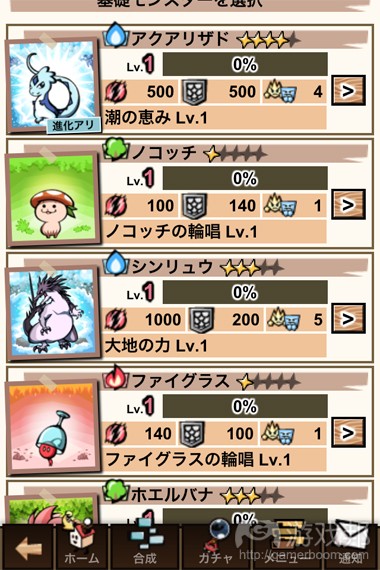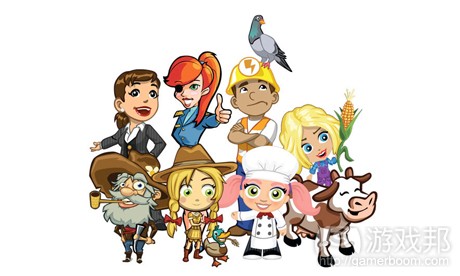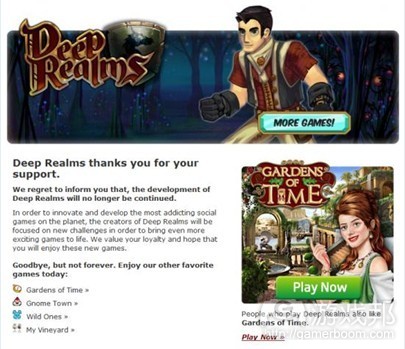每日观察:关注社交/休闲游戏2011年投资及并购所占比例(2.28)
1)Capcom旗下基于《怪物猎人》的卡牌社交游戏《Minna to Monhan Card Master》在Mobage上线4天收获50万用户(游戏邦注:该游戏发布于2月21日,同时推出智能手机和功能性手机版本)。
该游戏由东京社交游戏开发商gloops与Capcom合作推出,是Capcom第二款取材于《怪物猎人》的社交游戏,首款该题材社交游戏《Monhan Tankenki Maboroshi no Shima》于去年12月份在GREE平台发布时也仅历时数天就突破50万注册用户。
2)Zynga日本工作室最近向iOS平台推出一个名为《Montopia》的新社交RPG项目(Zynga日本工作室将其称为“Monster Battle RPG”)。
该项目由Zynga日本团队开发,目前仅锁定日本市场,同时支持日语和英语,尽管《Montopia》是社交游戏,但却并未登陆GREE、Mobage或Mixi社交平台。
据称该游戏其实是《口袋妖怪》翻版,风格类似于GREE游戏《Monster Planet》(Monpla),要球玩家踏上寻找怪物魔宠的旅程,让不同怪物杂交衍生出新品牌怪物,并与其他玩家进行决斗。据该工作室所称,这款游戏中目前已含有200种不同的怪物,即将推出Android版本。
3)据games.com报道,麻省理工《科技创业》杂志最近将Zynga评先为2012年全球最具创新的50强公司之一,其他上榜公司还包括苹果、谷歌、Facebook和Twitter。
值得注意的是,Zynga是今年唯一入选的游戏开发公司,以及上榜的两大游戏企业之一(游戏邦注:另一家上榜的是游戏云服务公司OnLive)。该杂志称Zynga入选的原因是Zynga“掌握了游戏传播,以及促使用户购买虚拟商品的技巧……”
4)投资银行Digi-Capital最新报告显示,社交及休闲游戏占据2011年游戏领域投资额和收购交易的半壁江山。
报告指出,社交及休闲游戏占2011年游戏行业投资额的57%,占收购和兼并交易的45%,并预计随着该领域竞争加剧,2012年的企业并购现象将更加普遍。
手机游戏领域在2011年的投资市场中占比30%,但在并购交易中的比例仍然较低,报告称其原因在于手机游戏市场仍未成熟。
预计2015年在线及手机游戏产值将达410亿美元,届时整个电子游戏市场规模将达820亿美元。
5)据Gamezebo报道,角色扮演游戏《Deep Realms》发布不足一年就已悄然撤出Facebook,Playdom公司通过该游戏Facebook页面宣布关闭这个项目(游戏邦注:观察者称,《Deep Realms》之前备受赞誉,并曾进入Gamezebo评选的2011年最佳Facebook游戏之列)。
值得一提的是,这款游戏实际上已在1月18日关闭,但却鲜有人注意到这种情况。
6)IHS最新报告指出,Facebook游戏已经发展至颠峰状态,约有3亿社交游戏玩家在过去一年中持续体验Facebook游戏,但Facebook在该时期并未引进更多新玩家,Facebook游戏今后只会开始走下坡路。
分析师指出,2011年游戏玩家在Facebook用户中占比25%,Facebook游戏市场在2011年达到成熟状态,但在2012年发展情况将逊于2009-2010年。
7)社交游戏创业公司趣加游戏(FunPlus Game)近日宣布,公司已完成1200万美元A轮融资,这也是迄今国内社交游戏行业A轮最大规模的一笔融资,本轮投资方来自金沙江创投(GSR Venture)。
该公司于2010年5月在北京和美国硅谷成立,2010年底第一款游戏正式上线,主要关注欧洲和中东市场,目前在Facebook拥有超过300万的日活跃用户,也是Facebook上活跃用户最多的亚洲社交游戏开发商之一。(本文为游戏邦/gamerboom.com编译,拒绝任何不保留版权的转载,如需转载请联系:游戏邦)
1)Capcom’s Monster Hunter Social Card Game Hits 500,000 Users – In 4 Days [Social Games]
by Dr. Serkan Toto
“Minna to Monhan Card Master”, a social card battle game based on the popular Monster Hunter action RPG series, has racked up 500,000 users on Mobage. The Capcom title needed just four days (between February 21 – it’s launch day – and February 25) to reach the milestone.
Co-developed with Tokyo-based social game maker gloops, Monhan Card Master is Capcom’s second social game based on their hit franchise Monster Hunter. “Monhan Tankenki Maboroshi no Shima” also took just a few days to hit half a million registered players on GREE when it came out last December.
The Mobage game was released on feature phones and smartphones simultaneously.(source:serkantoto)
2)Zynga Japan Is Still Active, Rolls Out Made-In-Japan Social RPG [Social Games]
by Dr. Serkan Toto
Zynga Japan has been very quiet for a while (the reason being they just weren’t very active or successful in recent months, to say the least), but now the company has rolled out a social RPG with original IP for iOS (Zynga Japan calls it a “Monster Battle RPG”).
What’s special about the game, dubbed “Montopia”, is that:
•Zynga’s Japanese team led development for the title
•Montopia is initially targeted at the Japanese market only (it’s not available in the US store at this point)
•the game is available in Japanese and English from the get-go
•even though it’s a social game, Montopia isn’t embedded in the GREE, Mobage, or Mixi networks
Montopia is basically a Pokemon clone, very much like GREE’s Monster Planet (Monpla), for example.
Players go out on adventures, find monsters, raise them, let monsters “mate” to create stronger ones, build a “team” of compatible monsters, battle against players, play gacha, collect virtual items, etc.
According to Zynga Japan, Montopia features a total of different 200 monsters initially.
I gave the iOS version a spin and must say Montopia is looking pretty good with regards to production value – I especially like the design and UI of the game. The obvious challenge for Zynga will be to get eyeballs for the title, as it’s not linked to any of the popular social gaming networks in Japan.
Going for a stand-alone app is an interesting move: on Montopia’s official page, Zynga Japan just says an Android version is to follow soon.(source:serkantoto)
3)Zynga is one of Technology Review’s most innovative companies in 2012
by Joe Osborne
Say what you will about Zynga, but it did lead social games into the mainstream–just look at Words With Friends. The Massachusetts Institute of Technology’s (MIT) Technology Review has included Zynga in its list, The 50 Most Innovative Companies of 2012. The now-public Hidden Chronicles maker is joined by staples, like Apple, Google, Facebook and Twitter.
However, Zynga is the only game creator to receive the honor this year, and one of two gaming companies. (Game streaming service OnLive earned a nod, too.) MIT says that social gaming has introduced new business models for gaming companies while dramatically expanding the appeal of computer games.
The main reason that MIT decided to include Zynga on its list of top innovators in tech is that the developer “has mastered the art of giving away games and then persuading players to make in-game purchases of virtual goods, sometimes adding up to many times the typical purchase price of a game,” according to the list.
Zynga has received its fair share of flak and praise over the past few months in light of the recent copycat allegations thrown its way. While it’s a no-brainer that the developer’s strategy has led it to create games that are uncannily similar to competitors’, it’s tough to argue whether Zynga helped blow a new demographic of gamers wide open and establish an entirely new genre.(source:games)
4)Social, casual market dominated game investments in 2011, report says
by Tom Curtis
It’s no secret that the social market has seen some rapid growth over the last few years, and according to investment bank Digi-Capital, the social and casual market accounted for roughly half of all game related investment and merger value in 2011.
In the company’s recent Global Games Investment Review 2012, it reported that social and casual games made up 57 percent of the game industry’s investment value, and 45 percent of its mergers and acquisitions value.
Digi-Capital further explained that major companies like Wooga and King.com are performing well in this crowded market, but the company expects that consolidation will become more popular in 2012 as the space becomes increasingly competitive.
Looking back at investment patterns in 2011, mobile gaming was the second most popular market in terms of investment value (30 percent), but remained relatively low in terms of mergers and acquisitions. Digi-Capital said that mobile-related merger numbers remained low since the market is still quite young.
MMOs, on the other hand, were the second post popular in terms of mergers and acquisitions (31 percent), but investment value remained low due to the high risk nature of these large-scale products. Digi-Capital expects MMO related mergers to continue in 2012 as the market shifts toward free to play business models.
With this noted shift toward social and mobile gaming, Digi-Capital encouraged traditional game publishers to invest in these sectors to maintain steady growth. The company particularly
pointed to EA’s PopCap and Playfish acquisitions as prime examples of a large publisher transitioning into these growing markets.
Looking several years ahead, Digi-Capital projects that online and mobile games will generate as much as $41 billion in 2015, pushing the overall video game software market past $82 billion during that year.
Last year, Digi-Capital published a similar report, noting that video game investments doubled in 2011 compared to 2010, with that growth primarily driven by social, mobile, browser, and cloud-based gaming. (source:gamasutra)
5)Deep Realms was closed more than a month ago – why didn’t anybody notice? Facebook
By Jim Squires
Deep Realms was an incredibly good role playing game for Facebook – at least that’s what I’ve heard. It earned a perfect score here on Gamezebo, made its way on to our list of the best Facebook games of 2011, and appeared on countless other best of the year lists too. So why haven’t I played it myself? Because when I finally say down to dive into Deep Realms depths today, I discovered that the game is no longer available for play.
Less than a year after its debut, Playdom has quietly killed the game from Facebook. If you try to visit the page that previously housed it, you’ll be presented with a message that reads as follows;
We regret to inform you that, the development of Deep Realms will no longer be continued. In order to innovate and develop the most addicting social games on the planet, the creators of Deep Realms will be focused on new challenges in order to bring even more exciting games to life. We value your loyalty and hope that you will enjoy these new games.
This isn’t the first time that Playdom has decided to bring one of their offerings to a close. Social City and ESPNU College Town both went offline in December, and Market Street went offline only a few months before that. But being such a critical success, we can’t help but wonder how it failed to gain the traction needed to stay alive.(source:gamezebo)
6)Report: Have Facebook games seen their best days already?
by Joe Osborne
The 300 million or so social gamers on Facebook have kept on playing for the past year. That’s great and all, but Facebook also hasn’t managed to bring in many more players in the same period. That leaves an IHS report to conclude that Facebook games have reached their peak. Of course, the only way to go is down, which is only ever a good thing on roller coasters.
And while that estimated 300 million served as half of Facebook in 2010, the rest of Facebook’s new audience seems to have moved even further from games. Gamers now only represent 25 percent of all Facebook users, as of 2011. So, while that number could easily remain the same, that percentage could easily drop even lower. And IHS’s Steve Bailey has somber news for new kids on the Facebook game block:
“Facebook rocketed to prominence as a gaming platform in 2009 and 2010,” senior analyst Steve Bailey said. “However, with equal speed, the market then settled into a state of maturity in 2011, with conditions becoming markedly more challenging for game operators. While Facebook remains a worthwhile opportunity for companies able to meet these challenges, the tone of the market in 2012 will be somewhat muted compared to the optimistic outlook of the past few years.”
Basically, this analyst echoes the opinions of Spry Fox’s Daniel Cook, who claims that the indie game renaissance on Facebook is over. (Though, his game was just picked up by Playdom, so take that with a grain of salt.) At any rate, social games on Facebook have reached their maturity point, making 2012 an ever more crucial year for the genre.(source:games)













































